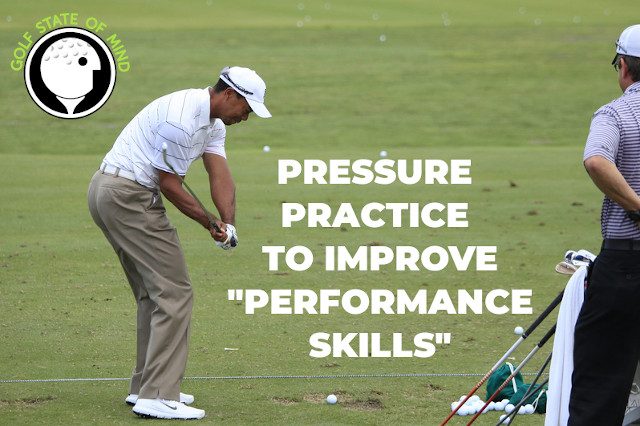
Pressure Practice For Golf
On the golf course and in tournaments:
-
- Every shot counts and has a consequence
- Every shot is a unique challenge
- There are several minutes between shots for possible “thinking” time
- Your heart rate is higher
Although most golfers know this to be true, they spend very little time practicing in a way that will help them to adapt to the changing (external and internal) conditions between practice and play. Instead, they over-practice the technical and don’t train their “performance skills” such as focus, dealing with consequences and internal state management.
Although the golf course is the best place to practice (after all, that’s where we play the game), most of us have more frequent access to driving ranges and practice facilities. For this reason, it’s important to find ways to simulate what we experience on the golf course and in tournament play, so we can improve our performance skills and become better at executing our best technical skills on the course.
I should clarify that I’m not implying that a golfer shouldn’t practice technique for golf – of course we need to work on technical skill development. But if you are to become a player who performs well under pressure, you’ll need to allocate time in every practice session to develop your mental game of golf by doing Pressure Practice For Golf.
Pressure Practice For Golf, trains you to:
- Get yourself into the competitive mindset
- Adapt quickly to challenges (instead of repetitions of the same shot)
- Think clearly in difficult situations
- Be more comfortable being uncomfortable
- Stick to your “Process”
- Deal with nerves in golf and higher arousal levels
I have plenty of pressure practice for golf drills and ways to create a competitive environment in the Golf State of Mind Practice book. In addition to the challenges in the book, your imagination is a very helpful tool in simulating the pressure of the real thing.
Before you go to your session, think about different situations which would change your internal state to be ready to use them in practice (you can write them down, ready to recall in the session). Ask yourself:
- What situations make you feel uncomfortable and will likely raise your arousal level?
- What situations will you be in if you are to achieve your goals?
- What shots will you face in your next round?
- What situations would likely cause negative thinking patterns?
Create vivid representations of them in your mind i.e. who you are playing with, the tournament, the golf course, the colors, the weather, etc.
Examples are:
- Your Tee Shot on the 1st hole of a tournament
- Your Tee Shot on the 2nd hole after a double bogey start
- Being under par at the turn and having a chance to shoot your best score
- Your tee shot on the 18th with a one shot lead
- Having to get up and down from around the green to force a play off or win a tournament
- Making a 2-putt from 30ft to win the tournament
- A 5 foot putt to win
For each shot:
-
- Go through your Pre Shot Routine
- Practice your Post Shot Routine and how you will respond to different outcomes
- Considering your heart rate could be 120 bpm or more during a tournament or in a “big moment”, run on the spot to get it there before hitting the shot. If you have a heart rate monitor on your watch you can get it to the desired heart rate before playing each shot.
- Take 1-2 minutes break in between shots to simulate the golf course and to make sure you don’t get into a rhythm of hitting shots (one of the pitfalls of normal driving range practice that leads to an “illusion of competence”). You could use the time in between to do some meditation for golf or to practice being alone with your thoughts (don’t get your phone out to occupy the time).
By doing more pressure practice for golf, you’ll discover more about the effectiveness of your current “performance process” in controlling your internal state and preparing for shots, and you can experiment with new ideas to give you further adaptability/tools under pressure.
Photo 24721483 © Photogolfer | Dreamstime.com


